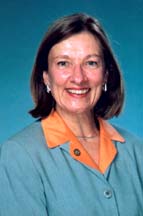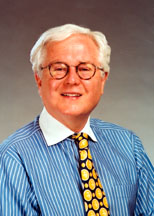 |
 |
|
|
Dealing with Crisis Takes Energy If your annual utility bill were about to go up by $700,000, you'd be looking at ways to save energy, too. The university expects its bill for 2001-02 to increase by that amount from the $1 million paid prior to the California energy crisis. The increase includes higher rates for electricity and natural gas, along with the cost of a generator the campus has rented to keep power on regardless of rolling blackouts. In response to the crisis, the university has assigned Physical Plant Associate Director David Kohler full time to address energy alternatives. Buildings are being retrofitted with more efficient lighting, and Kohler is looking into a thermal cooling system that operates in off-peak hours, producing the cold water necessary to air condition the campus during the heat of the day. In addition, employees in some buildings with a minimal number of employees working this summer may be relocated. Staff at the Truesdail Center, for example, will be temporarily moved to the Administration Building. Some Liberal Studies Programs courses that meet at the Gannett Center will be relocated. And Summer Conference Programs will consolidate their residence hall usage. "If there is a silver lining behind the state's energy crisis," Kohler said, "it is that it's forcing all individuals and organizations to become much more aware of how we're using our resources. In the long run, more efficient equipment and better consumer education will be of benefit to the environment as a whole." The crisis took a toll on the 2000-01 university budget as well, resulting in a unique Redlands Fund appeal. Earlier this year, the university turned to alumni and friends for help with the excessive energy bills. Enclosed with the plea was a copy of the university's Edison bill from December--for $63,262.94, double the usual monthly costs. "We felt that the university community would be interested in knowing the impact," said Associate Vice President of Development Neil Macready, "and they have responded by supporting their alma mater." More than $50,000 was pledged. School of Business Dean Named
Meyers' appointment continues the university's efforts to enhance its business degree programs to meet the needs of working adult students seeking a high-quality academic experience. "Pat brings exceptional academic and management background to this position," said President James Appleton. "Her particular expertise in marketing will be of great value as we position the quality of Redlands programs in the very competitive area of business education." The School of Business is an outgrowth of the university's former Whitehead College, which began in 1976 as one of only three programs in the state offering degree programs for working adults. That number since has increased to include more than 60 colleges and universities in Southern California alone. Redlands' offerings for working adults now have been separated into two schools--the School of Business and School of Education--providing more focused attention in these areas. A series of dedication events for the School of Business will be held in the fall. "I am particularly attracted to the School of Business at Redlands because of its commitment to blending high-quality professional and liberal education," said Meyers. "Its programs are designed to develop both content knowledge in business and the critical, analytic, ethical and communication skills that are necessary in today's complex global business environment. "Redlands is uniquely qualified to fulfill this mission, with a 100-year-old tradition of academic excellence throughout the institution and nearly 30 years' experience in designing curriculum and teaching methods tailored to the working adult. I look forward to working with students and businesses throughout Southern California as they seek the best possible education for success in the 21st century." During her years at Northern Arizona, Meyers established partnerships with such businesses as Oracle, Bank of America and Bank One and was appointed to the Arizona Partnership for the New Economy. Fund raising for the College of Business Administration went from $150,000 up to $3 million annually. Meyers previously worked in a variety of positions at Syracuse University, including as associate dean for master's degree programs in the School of Management. For 10 years, she served as associate director of the Innovation Management Program, a program funded by Xerox Corp. and General Electric Co. to research the influences of innovation in American business. Her research and teaching experience has been in such areas as new product development, implementation teams, organizational learning, relationship marketing, management of innovation and technology management. Meyers received her Ph.D. and M.B.A. in marketing from Syracuse University. She earned a master's degree in English language and literature from the University of Michigan and bachelor's degree in the same field from Mercy College in Michigan. |
||
Campus News Out & About Employee News Suggestion Box Memos & Announcements Press Releases Calendars Archives Contact Us |
||

